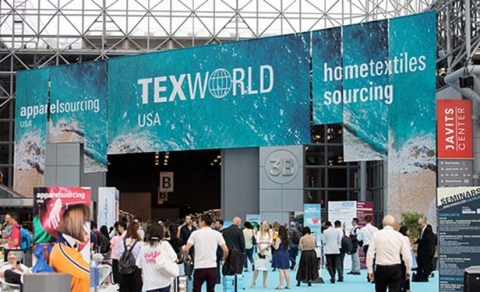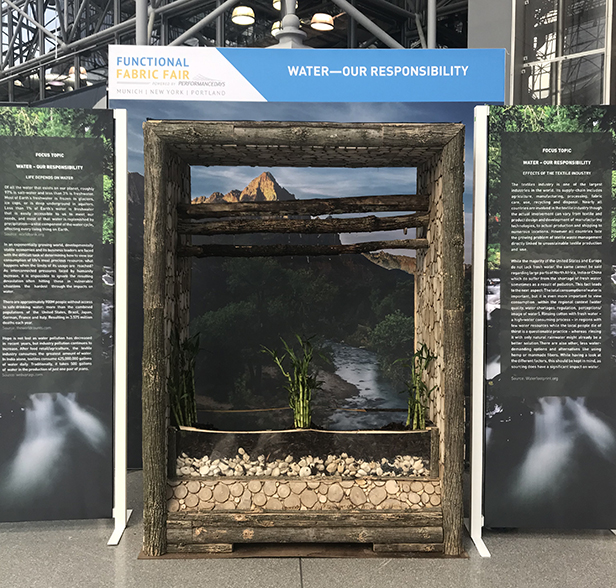Apparel Industry Sourcing Events Embrace Sustainable Practices

If there’s a trend taking over the apparel industry, it’s sustainability. That was made clear at Functional Fabric Fair and Texworld USA, two apparel sourcing trade shows held simultaneously July 22-24 at Javits Center in New York City. The shows included more sustainable educational content and showfloor resources for attendees, as well as on-site practices and exhibitor sustainability requirements.
Functional Fabric Fair Doubles Eco-Friendly Exhibitors
Functional Fabric Fair powered by Performance Days is organized by Reed Exhibitions and presents apparel industry professionals with the most current innovations in high-performance functional fabrics, finishes, trims and accessories from fabric mills and branded technology companies in a sustainable/minimal waste exhibition.Now in its second year in the U.S., Functional Fabric Fair doubled its exhibitors and increased attendance by 75 percent compared to its inaugural event. These numbers indicate a growing interest in creating apparel that is functional and sustainable, according to show officials.
The show’s 135 exhibitors had to meet certain criteria to participate in the event, including being certified by Bluesign, a system thatensures products were manufactured with responsible use of resources, and the lowest possible impact on people and the environment. Attendees had a chance to review sustainable solutions such as e.dye’s waterless color systems and Polartec’s clothing featuring stain-resistant technology that reduces the need for regular washing.
Functional Fabric Fair supplied the booth package for all exhibitors. Created by FB International, a trade show decorator based in New Jersey, booth walls are made of reusable Veloce fabric, which is made from recycled poly and plastic.
According to Steve McCullough, Functional Fabric Fair event manager, exhibitors are not permitted to bring booths made of unsustainable materials such as foam to the show. This rule not only helps reduce waste, but also means exhibitors ship less material, therefore reducing the environmental impact of transporting heavy booths to the show.
The event also used a pre-carpeted space that prevented the need for temporary carpet on the showfloor and worked with Javits Center, a LEED-Silver facility, on recycling programs and reducing single-use plastics.
Chadaé Bowler, senior manager of marketing at Reed Exhibitions, says sustainability is woven into all of Functional Fabric Fair’s educational sessions. Outside of the formal education program, the show paid a particular focus on educating its audiences about water conservation.

“Water sustainability is a big focus, which is why we created a focus topic wall that covers the effects of water usage and how the industry can educate consumers,” Bowler says.
McCullough adds that all consumers must be cognizant of the amount of waste that comes from the production of clothing.
“As an event serving the apparel textile industry, it’s important to us to promote increased sustainability in clothing production and to reinforce that focus with our own sustainability efforts in producing the Fair,” he says.
Functional Fabric Fair will hold its next edition in Portland, Oregon, Oct. 22-23. As a LEED-Platinum facility, the Oregon Convention Center maintains very strict rules for events and participants that the show will implement. The event plans to carry over several of those rules upon returning to New York July 20-21, 2020, as it continues its push toward zero-waste status show-wide.
“Next year we will not allow foam core at the show even if you plan to reuse it,” McCullough says.
Texworld USA Dubs 2019 as the #yearofsustainability
Next door to Functional Fabric Fair at Javits Center, Texworld USA, one of the largest textile sourcing events on the East Coast for apparel fabric buyers and sourcing professionals, was also highlighting sustainability. The event even created the hashtag, #yearofsustainability for the this year’s show.
Messe Frankfurt, Texworld’s parent company, has taken steps to cut its own environmental impact by using renewable power, efficient recycling and more at its headquarters in Frankfurt, Germany.
Texworld USA has taken similar measures, including cutting down on printed materials, reducing carpet by 33 percent and using banners from previous editions, which will result in recycling approximately 2,500 feet of signage, according to show officials.
Lauren Klopfenstein, marketing manager of fashion and apparel at Messe Frankfurt, says the show plans to achieve zero single-use plastic on the showfloor.
“We’re using recycled paper cups in the Tulip Club [the show’s VIP lounge] and encouraging attendees to bring their own water bottles,” she says.
Texworld USA is also delivering more sustainable sourcing solutions for attendees through its suppliers and educational program.
“We have three times as many eco-friendly exhibitors as last year, and we’re featuring 10 complimentary educational seminars covering sustainable practices,” Klopfenstein says.
The show kicked off its program with Fashionsustain,a one-day conference originating in Berlin dedicated to educating attendees on sustainable practices.
Keynote speaker Liz Hershfield, head of product development, production and sustainability for Walmart eCommerce, provided advice about the necessary actions for achieving sustainability in the fashion industry. Fashionsustain also covered topics including transparency and traceability, challenges facing established brands and innovation in sustainable materials.
Jennifer Bacon, Texworld USA show director of fashion and apparel, says as trailblazers within the textile industry, the show always tries to spotlight what’s trending. This year, sustainability was the focus.
“Because being sustainable has reached a point that it’s too important to ignore, our show now explores the importance of speed to market as well having the ability to supply eco-friendly sourcing options in order to retain and obtain buyers,” Bacon says.
She adds, “Manufacturers are starting to see this as a requirement and not just an option, due to increased global concerns about business practices.”
By adding Fashionsustain and three times as many sustainable exhibitors as last year, Texworld USA is making it easier for buyers to make sustainable merchandise choices.
Texworld USA will continue its sustainability efforts at its next edition, set for Jan. 19-21, 2020 at Javits Center.
The trade show industry is reported to generate over 600,000 tons of waste each year along with a substantial use of energy. With that in mind, the green steps these shows are taking are truly important in reducing the industry’s overall negative impact on the environment.
Don’t miss any event-related news: Sign up for our weekly e-newsletter HERE and engage with us on Twitter, Facebook, LinkedIn and Instagram!


Add new comment